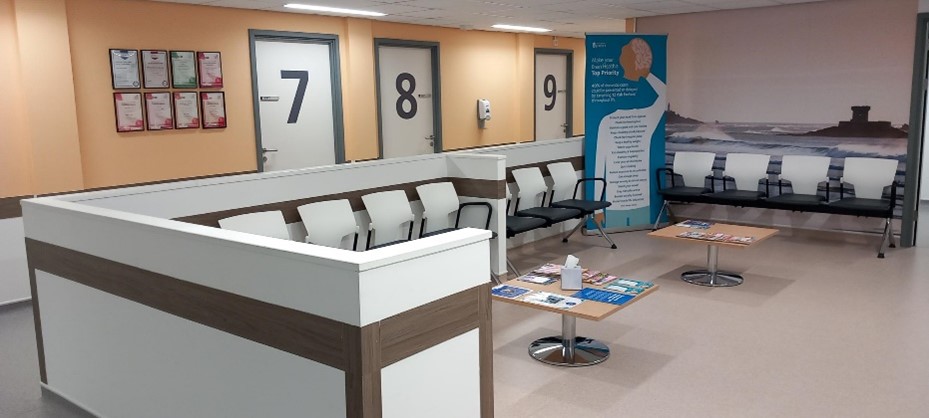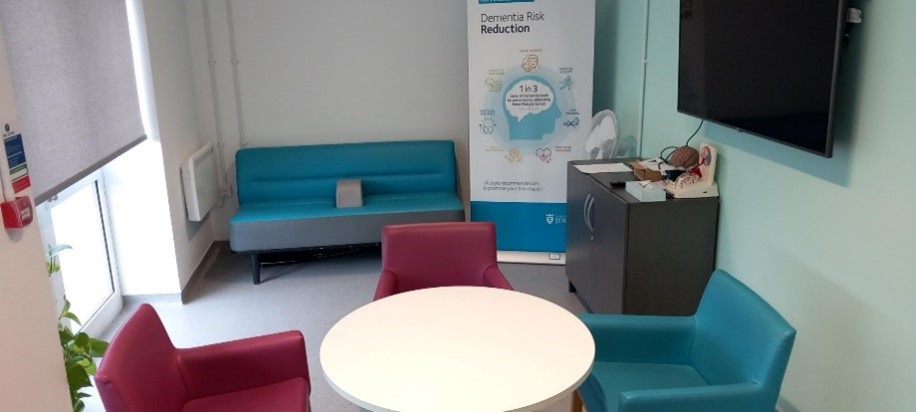The Memory Assessment Service (MAS) also known as the Memory Clinic, offers comprehensive assessment, diagnosis, and treatment advice for memory and cognition issues.
Our team helps you understand and manage various aspects of cognitive function, including:
Specialist Doctor
The Specialist Doctor conducts initial assessments, communicates the diagnosis and discusses treatment options.
Nurse Practitioners and Clinical Nurse Specialist
Who are involved with initial assessments for patients over the age of 65. They also run the follow-up clinic. The Nurses provide advice and support on a range of topics, including anti-dementia medication.
Clinical Psychologist
The Clinical Psychologist may be involved with initial assessments. They also receive referrals to complete in-depth cognitive assessments with patients, especially when the diagnosis is not clear.
Occupational Therapist (OT)
OTs complete functional assessments in your home, to better understand how cognitive changes affect your day-to-day activities. The OT aims to reduce risks while enabling patients to maintain their independence.
The OT can help you to work towards specific goals and provide advice on assistive technology.
Support worker
The support worker has an input throughout the patient’s journey.
The Support Worker’s role includes:
- monitoring blood pressure when a patient starts an anti-dementia medication
- medication management at home
- facilitating Cognitive Stimulation Therapy
Administration staff
Admin staff support the team, greet you at the reception desk and assist you with general queries.
Other specialised care
Our team works directly with local health and care professionals such as the:
- Mental Health Dietician if there are concerns about nutritional intake or a need for nutritional supplement support.
- Speech and Language Therapy service, for adults who have speech, language or swallowing difficulties resulting from a neurological condition such as dementia
- Audiology department, for those with a hearing impairment
We work closely with the local charities including Dementia Jersey and EYECAN.
How to access our service
Your GP or another healthcare professional must refer you.
You cannot self-refer to the service.
Our location
We're located at the Enid Quenault Health and Wellbeing Centre.
To get to our reception:
- enter the Enid Quenault Health and Wellbeing Centre via the main doors
- continue straight ahead through the sliding doors
- follow the beige sign for Older Adult Community Mental Health
- turn left onto the main corridor
- walk through the next set of double doors to the MAS waiting area
- the reception desk is just as you walk into the waiting area
Our clinic space is in a bright, quiet area on the ground floor of the building.
If you need help planning your visit to the clinic, call our reception team.
Our reception area

Our clinic space

What to expect at your clinic appointment
When you come for your appointment, you'll meet with a member of our team.
They'll ask you questions about your:
- memory
- physical health
- mood
- daily activities
- interests
This helps us understand any difficulties you're experiencing and how they affect your everyday life. During your initial appointment, we'll complete some assessments including routine physical investigations such as height, weight and blood pressure, and a cognitive questionnaire designed to test your:
- memory and cognition
- attention
- language
- comprehension
- reasoning
The assessments tell us what you do well and the tasks you find a little more difficult.
If your doctor requested a blood test, brain scan, or electrocardiogram (ECG) for you, we'll review the results and discuss them with you at your appointment. If these tests haven't been done, we may ask for them to be carried out. If necessary, we’ll invite you back to the clinic to discuss your results once the information is available.
Once all assessments are complete, the Specialist Doctor will discuss the results, provide a diagnosis, and recommend appropriate treatment.
What to bring to your clinic appointment
We recommend you bring:
- reading glasses
- hearing aids
- an up-to-date list of your medications
You may bring someone with you to your appointment. It should be someone you’re happy to share your personal information with.
Follow-up support and treatment
During your assessment, we'll discuss possible follow-up interventions and extra support that may be suitable for you and your family. You may meet other team members depending on your needs. You may also be offered a functional assessment at home with the Occupational Therapist.
If you need extra support at home, we can make a referral on your behalf to a Social Worker. If you already have someone informally helping you at home, they may be offered a carer's assessment.
If you're prescribed medication by the service, we'll stay in contact with you and monitor how it's working. We may also recommend other non-pharmacological interventions including:
Cognitive Stimulation Therapy (CST)
CST is an intervention to support cognitive function for people who have mild to moderate dementia. Research has demonstrated that CST can help to improve quality of life and benefit memory and thinking skills.
We deliver weekly group sessions in a 14-week programme. We can also facilitate one-on-one sessions in your own home.
Cognitive rehabilitation
Cognitive rehabilitation therapy can make managing everyday activities easier for people with early-stage dementia. Studies have shown that it can also help you maintain independence.
It is often delivered one-on-one over several sessions.
The therapist will find out what you want to improve or manage better and help you choose the most important thing to tackle. They will suggest strategies to help and support you in achieving your goals.
Mind-body movement
Mindful movement principles such as tai chi and qigong, pronounced chee-gong, have been shown to benefit cognitive function. The meditative and slow, deliberate movements may promote better cerebral blood flow, reduce inflammation, regulate the autonomic nervous system and improve quality of life.
During these sessions you engage in slow, controlled movements. You can do this either seated or standing. We focus your attention on the shape and pattern of movement, how it feels, to encourage relaxation.
Post diagnostic educational group
This is a group for the carers and relatives of our patients who are diagnosed with dementia. We give information about:
- the symptoms of dementia
- communicating with someone who has dementia
- advanced care planning
- making the home environment dementia-friendly
The final session is a summary session for both people with dementia and their carers or relatives.
The group runs when staff and participants are available to form a new cohort. So, we may also signpost you to Dementia Jersey’s Dementia Information Programme (DIP) for Family Carers if that can be accessed sooner.
Diet and brain health
To function, the human body and brain rely on a combination of:
- vitamins
- minerals
- antioxidants
- fats
- carbohydrates
- water
- protein
These nutrients help regulate your body and mind, repair and replace cells, and produce hormones and neurotransmitters.
Without these nutrients, your body prioritises survival, often sacrificing mental wellbeing and energy levels.
Improving your nutritional intake can directly affect mental health symptoms and improve overall mental wellness. For example, omega-3 fatty acids, found in fatty fish like salmon and sardines, and plant sources like walnuts, chia, and flax seeds, can reduce inflammation in the nervous system. They are used therapeutically to help manage neurodegenerative disorders such as Alzheimer’s and Parkinson’s diseases.
The MIND diet
The MIND diet is a combination diets proven to benefit cardiovascular, and brain
health.